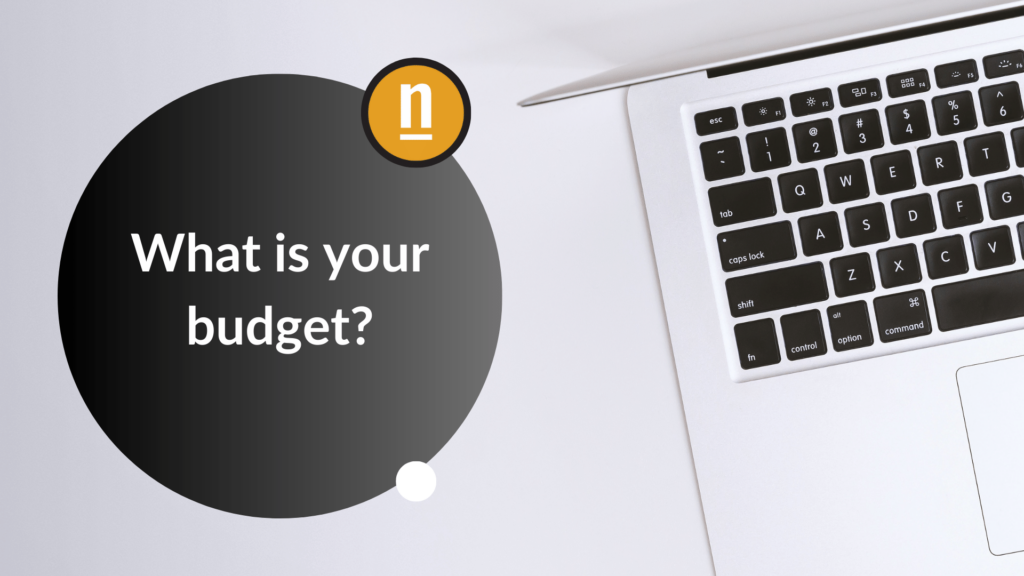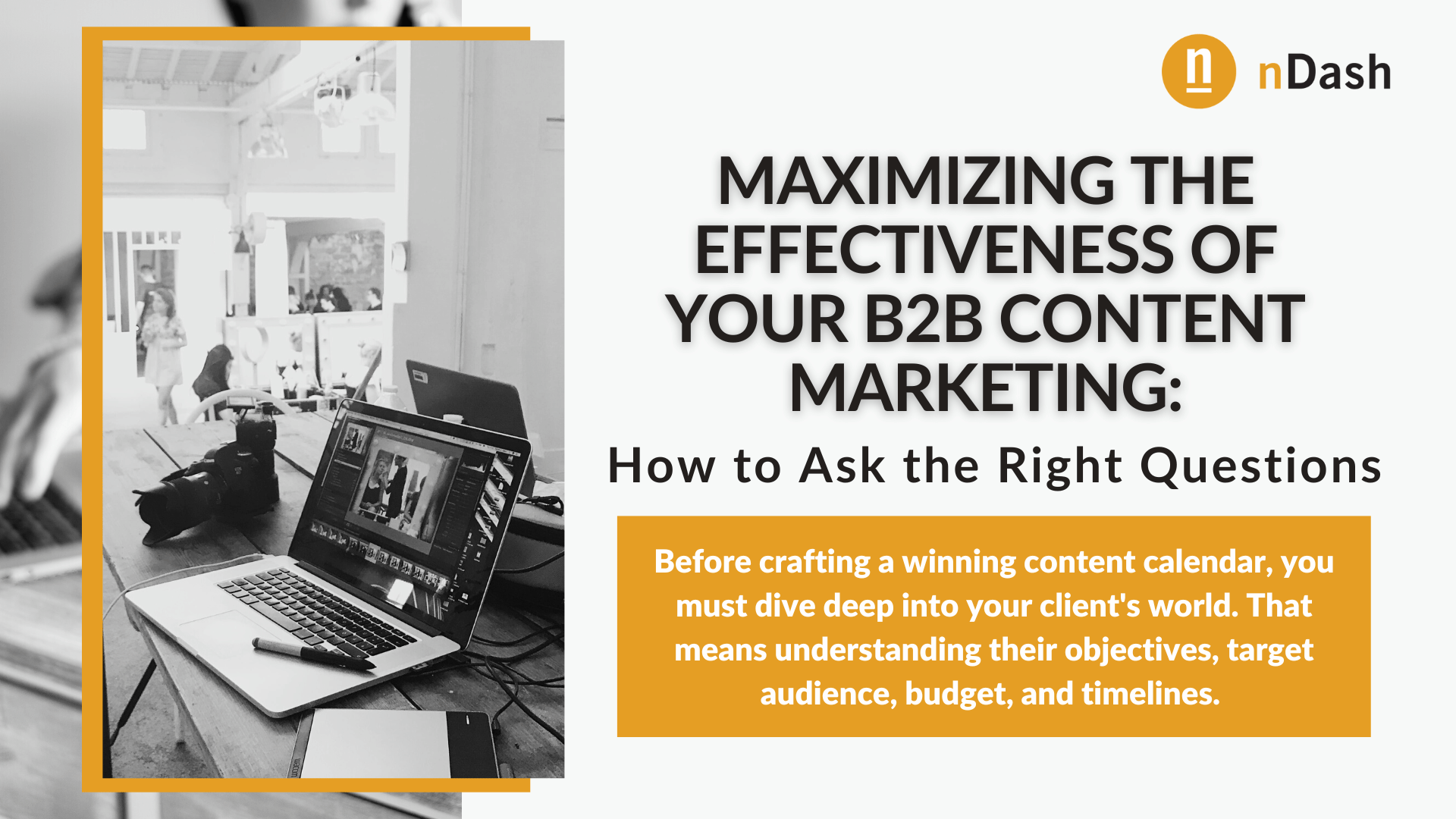5 Questions Agencies Should Ask B2B Content Marketing Clients Before Creating a Content Calendar
In a digital era, B2B content marketing is essential for businesses to engage with audiences and achieve goals. But how can you plan and execute an effective content strategy? It all starts with the highest quality content calendar.
But wait, there’s a catch!
Before crafting a winning content calendar, you must dive deep into your client’s world. That means understanding their objectives, target audience, budget, and timelines. Here, we walk you through the five questions every agency needs to ask their clients to create a content calendar that slays.

Question 1: What are your business objectives?
Before creating a content calendar, an agency must understand its client’s business goals. This step includes understanding what the client hopes to achieve through B2B content marketing efforts. By identifying the client’s business goals, the agency can develop a content strategy that aligns with the client’s vision, mission, and values.
For instance, if the client aims to increase brand awareness, the agency may prioritize creating content that resonates with the target audience and appeals to their interests. Similarly, if the client intends to generate leads, the agency may focus on producing content highlighting the client’s expertise and unique selling propositions.
Without a clear understanding of the client’s business goals, the agency may create content that misses the mark, fails to engage the target audience, or doesn’t contribute to achieving the desired outcomes. Therefore, agencies need to delve deep into their client’s business objectives.
To better understand their client’s business objectives, an agency should ask questions like:
- What are your business goals for the year?
- What are your current marketing challenges?
- What do you hope to achieve through your content marketing efforts?

Question 2: Who is your target audience?
The success of a content marketing campaign depends on creating content that resonates with the target audience. Therefore, an agency must understand who the client’s target audience is. B2B marketers can establish thought leadership and trust by addressing audience pain points with valuable content.
This strategy helps build brand awareness, generate leads, and nurture customer relationships. For instance, if the target audience includes working mothers, the agency may create content that provides tips for balancing work and family or share stories of successful women in similar situations.
Moreover, understanding the target audience can help agencies to determine the most effective channels for content distribution. For example, suppose the target audience is primarily active on social media platforms like Instagram and Facebook. In that case, the agency may focus on creating visually appealing content that is easy to consume and share.
Knowing the target audience’s demographics, interests, pain points, and online behavior is critical for a successful content marketing campaign.
To gain a deeper understanding of the target audience, an agency should pose questions like:
- Who are your ideal customers?
- What are their pain points and challenges?
- What motivates them to make a purchase?

Question 3: What type of content do you want to create?
Once an agency understands the client’s business goals and target audience, it must determine what type of content to create. This step includes understanding the content’s format, tone, and style. Let’s break it down:
- Format: This refers to the medium the content is delivered. Examples include blog posts, videos, social media posts, infographics, podcasts, or webinars. The choice of format should align with the preferences and behaviors of the target audience. For example, the agency may prioritize creating infographics or videos if the target audience is predominantly visual learners. Alternatively, if the target audience prefers written content, the agency may focus on developing blog posts or whitepapers.
- Tone: This refers to the attitude or style that the content takes. The tone should be consistent with the client’s brand voice and values. For instance, if the client’s brand is known for being humorous and irreverent, the content should reflect this tone to maintain brand consistency and appeal to the target audience.
- Style: This refers to how the content is presented. Examples include a how-to guide, listicle, case study, or thought leadership piece. Select the style based on the content’s objectives and the target audience’s preferences.
Selecting the best content type is integral for developing an effective B2B content marketing strategy. For example, clients may want to create blog posts, social media posts, videos, or infographics.
To gain a clear understanding of the content that the client wants to create, an agency should ask questions like:
- What type of content has worked well for you in the past?
- What type of content will resonate with your target audience?
- What tone and style do you want to convey in your content?

Question 4: What is your budget?
When creating a content calendar, it’s essential to understand the resources required to execute the content strategy. These resources can include time, money, and talent. Without proper planning, these resources can be quickly depleted, leading to an ineffective content marketing campaign.
Therefore, before creating a content calendar, an agency must clearly understand the client’s budget. This includes the amount of money the client is willing to spend on content creation, distribution, and promotion. Knowing the budget will help the agency to develop a realistic plan that aligns with the client’s financial resources.
Additionally, understanding the budget will help the agency to determine the resources required to execute the content strategy. For instance, if the budget is limited, the agency may focus on creating less resource-intensive content, such as blog posts or social media posts. Alternatively, the agency may consider investing in more resource-intensive formats, such as videos or webinars, if the budget is more substantial.
Moreover, understanding the budget will help the agency to allocate resources effectively. By knowing the amount of money available, the agency can hire the necessary talent and allocate the appropriate amount of time to each aspect of the content marketing campaign.
By knowing the financial resources available, the agency can develop a realistic plan that aligns with the client’s goals, maximizes available resources, and helps achieve a successful content marketing campaign.
To better understand the client’s budget, an agency should ask questions like:
- What is your content marketing budget for the year?
- How much are you willing to spend on content creation and distribution?
- Are there any budget constraints that we should be aware of?

Question 5: What are your timelines?
Understanding the client’s timelines is crucial for ensuring the content is delivered to the target audience at the right time. For instance, if the client is launching a new product or service, the agency must ensure the content is ready and delivered on time to support the launch. Similarly, if the client has a seasonal business, the agency must ensure that the content is delivered before the start of the season to generate maximum impact.
Moreover, understanding the client’s timelines is critical for ensuring the content is created and distributed on time. This includes setting deadlines for content creation, approval, and distribution. By setting deadlines, the agency can ensure that the content is created and delivered on time, minimizing the risk of delays and ensuring that the content meets the client’s objectives.
Additionally, understanding the client’s timelines is essential for measuring the success of the content marketing campaign. This includes setting milestones for measuring the performance of the content and adjusting the content strategy accordingly. For instance, if the content isn’t generating the desired results, the agency may need to adjust the content strategy or the distribution channels.
By setting clear deadlines for content creation, distribution, and measurement, the agency can ensure that the content is delivered on time, meets the client’s objectives, and generates the desired results.
To gain a better understanding of the client’s timelines, an agency should inquire about the following:
- When do you want to launch your content marketing campaign?
- What are your key milestones and deadlines?
- How often do you want to publish new content?
Maximizing the Effectiveness of Your B2B Content Marketing: Asking the Right Questions
Creating a content calendar is a crucial step in a successful B2B content marketing campaign. However, before creating a content calendar, an agency must first understand its client’s business goals, target audience, type of content, budget, and timelines. By asking the right questions, an agency can create a comprehensive content strategy that meets their client’s needs and helps them achieve their business objectives.
How nDash Helps Brands Create a Winning B2B Content Marketing Calendar
Ready to maximize the effectiveness of your B2B content marketing? Let nDash help! Our platform provides everything you need to ask the right questions, develop a comprehensive content strategy, and achieve your business objectives. Whether you need expert guidance, an easy-to-use content management system, or content distribution services, nDash has you covered. Contact our team today and take your content marketing to the next level!

